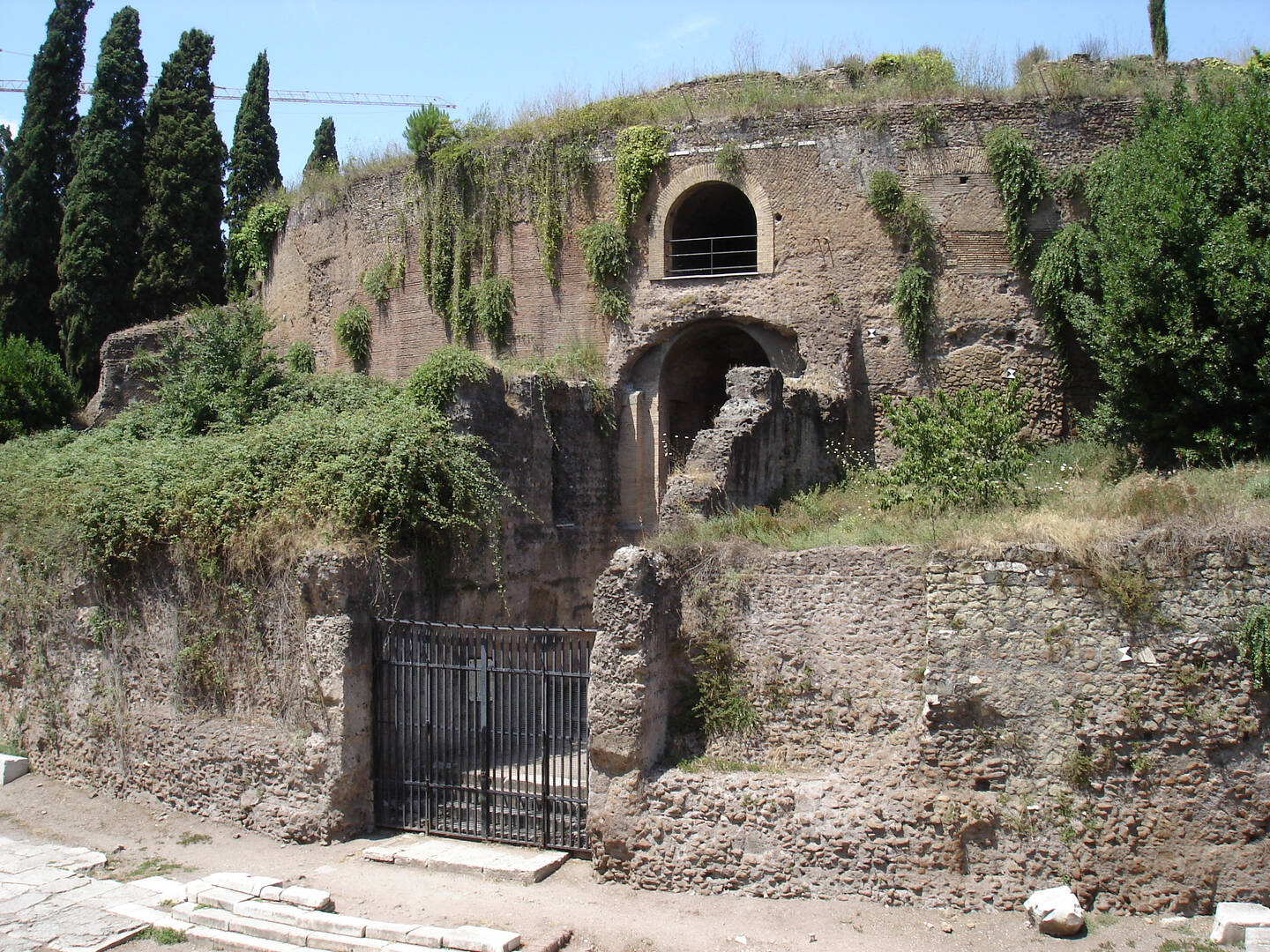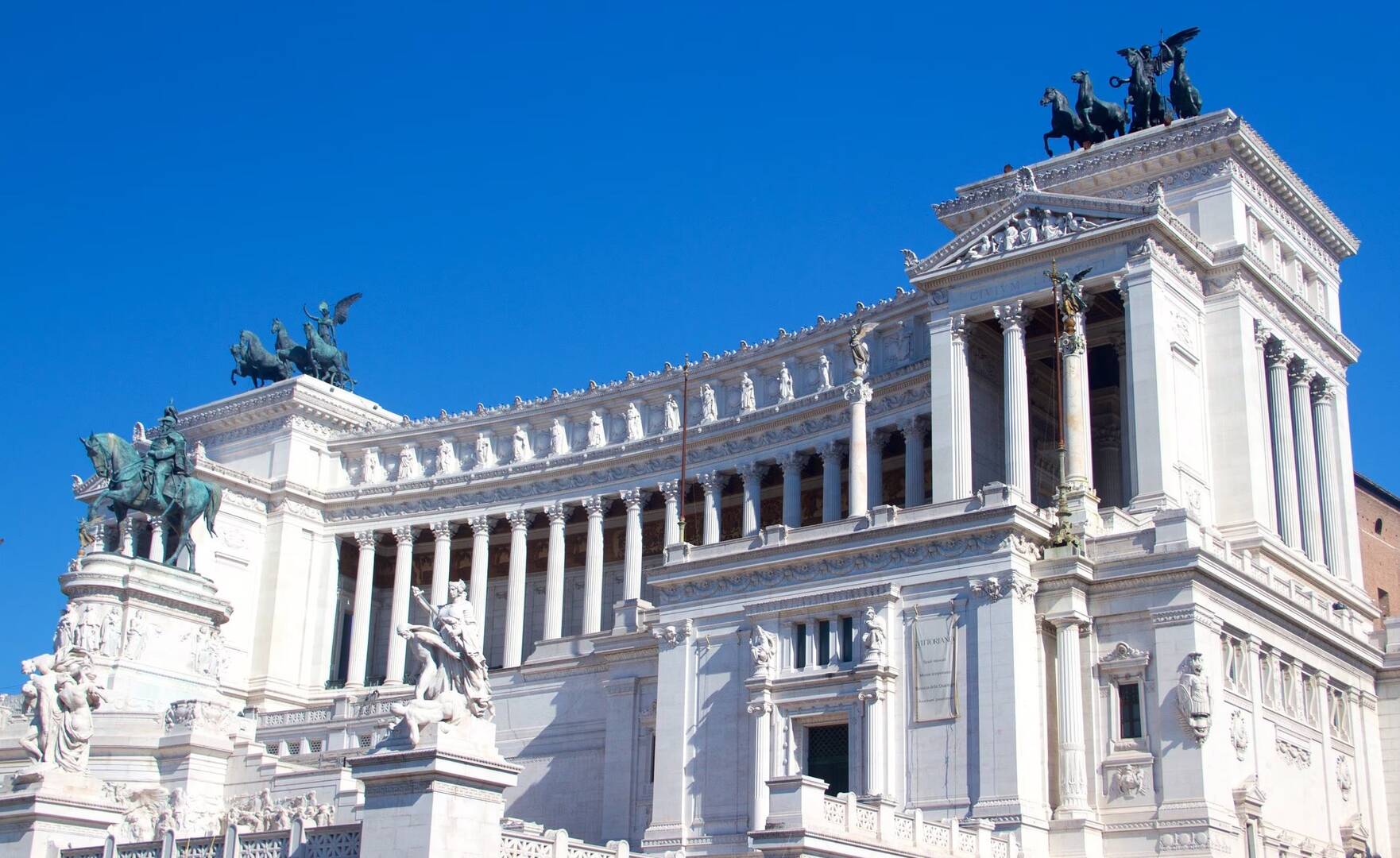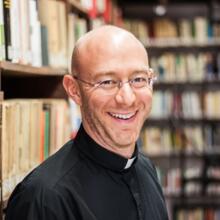Last Wednesday, as the sun was rising in Rome and ballots were being counted across America—but before any swing states had been called—I took a brisk walk to the mausoleum of the Emperor Augustus. Caesar Octavian Augustus, arguably the greatest political leader the world has known, is mentioned in Luke’s Gospel for initiating the census that prompted the Holy Family’s trip to Bethlehem. The Christmas liturgy indirectly acknowledges Augustus’s good rule, placing the birth of Christ during the 42nd year of his reign, “the whole world being at peace.”
Augustus’s mausoleum today is a circular heap of bricks. A promised renovation to open the site to the public has yet to materialize. The occasional whiff of urine suggests the regard Rome’s denizens have for Octavian. The rubble contrasts with a monument down the street to Victor Emmanuel II, the middling aristocrat who happened to be in the right place at the right time to become a unified Italy’s first king. That monument—massive, ornate and disconcertingly white—doesn’t tell any particular narrative; it is a monument to monumentality. The juxtaposition has always struck me as rather unfair. Sic transit gloria mundi.

The buildings surrounding the mausoleum date from the 1930s and show the fascist era’s uncanny knack for melding the spartan with the pompous. Fascism ended up such a resounding failure that the word itself has become a generic insult, an overused intensifier without particular content. “Fascist” was tossed around in the American presidential campaign, but the barb probably harmed the candidate using it more than its target. Today, the fascist facades fronting the piazza feel unavoidably soulless, but I remind myself that in the mid-20th century, they seemed like progress. People at the time thought that was how the future should look.
Constitutional protections
As I hustled back from my walk for coffee with an Italian colleague, election results were coming in. Pennsylvania went for Donald J. Trump while I approached the café, and when I arrived, my colleague looked up from his phone and greeted me with a wry grin. “You have a new president,” he said.
“Or an old president,” I responded.
Both Mr. Trump and Kamala Harris had their European fans. As in the United States itself, a world of difference exists in how the two groups perceive each other. The Trump fans tend to be more circumspect—like the “shy Trump voters” who don’t show up in polls—while the Harris fans tend not to realize that Trump supporters actually exist. On election morning, my WhatsApp feed filled up with American flags from the Trump fans, while another friend asked solicitously, “Do you think you’ll be O.K.?”
I recall that, on a similar post-election morning in 2016, when a Spanish Jesuit asked me how all the predictions could have been so wrong, how the polls could have missed so many millions of people, I realized that Mr. Trump had won the election with people who quite literally didn’t count.
That lesson has been only partially assimilated, I think. Mr. Trump’s victory remains bewildering to many—though not all—Europeans, especially those who consider themselves well-informed. Europeans generally don’t realize just how much Americans’ faith in the media has collapsed. My Italian colleagues still take the reporting of The New York Times as authoritative, for example, without realizing that a Times imprimatur will produce a snort from at least half the American population.

When one starts to try to explain the machinery of the American government abroad—how do you say “checks and balances” in Italian?—you realize how complicated it is. State and federal laws overlap and chafe against each other; primaries, caucuses, conventions and the Electoral College are all involved in choosing presidents; our parties seem to invert their constituencies every half century or so. The rules are a lot like those of American football: easy to follow if you’ve grown up watching but confounding to explain from scratch. I have been asked occasionally by those perplexed by this strange sport whether there is not something structurally wrong with the American Constitution, if, after a couple of centuries, it is not outdated.
The question reveals one of the most common misunderstandings of American democracy I find in Europe—a continent, since the French Revolution, tragically prone to utopian fantasies. I have been a bit gloomy when discussing candidates this election season, but not about the Constitution. The U.S. Constitution, after all, was designed not to usher in a brave new world or to churn out another Octavian Augustus. It was designed to thwart him.
Octavian came to power by ruthlessly dispatching his opponents. America’s Constitution is designed to avoid a dictator, maybe even keep those opponents alive. In the 236 years since its ratification, other systems have promised more and delivered less.
Christian values
If there is a single theological idea at the heart of the U.S. Constitution, it is original sin. “If men were angels, no government would be necessary,” James Madison wrote shrewdly in The Federalist, No. 51. “If angels were to govern men, neither external nor internal controls on government would be necessary.” Many have complained in recent years—yours truly included—about the poor character of our current leadership. Bad characters seeking political power, however, is a problem the Constitution amply anticipates.
But, while the good design of a ship can make up for a certain amount of ineptitude in the crew, it can’t do so forever. Good—even acceptable—government requires a degree of virtue among rulers and ruled. If Vice President Mike Pence had been a man of lesser integrity during the Capitol riot of 2021, or the filibuster had been abolished and the Supreme Court packed in the years that followed, then the ship of state might well have taken on more water than she could handle. The Constitution is a good rig, but I am less confident about our culture.
The signs of trouble are hardly lacking. In 2000, Robert Putnam’s Bowling Alone warned of the erosion of the kind of voluntary associations that build community and create “social capital.” Today, even our families are structured less around the well-being of children than the self-fulfillment of adults.Religious faith and practice have fallen dramatically in recent decades, with most Americans agreeing this is a bad thing. We care less about God, country and each other and more about having money.
Last year, Louise Perry, an agnostic British journalist, asked the question, “Are we repaganizing?” In particular, Ms. Perry pointed to the assumptions behind current attitudes toward abortion, our shift from a society that sees every human life as infinitely valuable to one in which the strong can exercise absolute dominance over the weak. In the history of human societies, Ms. Perry pointed out, Christianity’s insistence on the dignity of the weak is something of an aberration. In the United States, public opinion on abortion—with, in the past election, heartening exceptions of prairie decency in South Dakota and Nebraska—is more in tune with pagan Rome than Bethlehem.
On my way back from Augustus’s tomb, I passed another monument that embodies this ancient clash of worldviews. Along my route was the 100-foot-tall Column of Marcus Aurelius, carved from top to bottom with scenes of the emperor’s Germanic wars. Atop this monument to imperial might, however, a bronze statue of St. Paul now presides. The sword in the apostle’s hand is the symbol of his own martyrdom—a sign of the inversion of values that took place when Rome adopted Christianity. Today, like a swing state, our values seem to be flipping back to paganism—and that worries me far more than the outcome of any election.
Our nation’s character
The American experiment will go on, now under different leadership, for another four years and, I hope, quite a while after that. But I suppose I walked up to Augustus’s tomb to remind myself of the broader horizon in which Christians live. I am rather fond of my native land and her robust and quirky republican traditions, but Jesus did not preach democracy nor endorse any particular political philosophy. He preached a new vision of reality itself and offered a new way of being human.
We can argue about policy and systems, write articles and issue statements, but Christian values must be embodied in human beings who have come to believe in one whose kingdom is not of this world. When Octavian returned to Rome after defeating Antony, Cleopatra and assorted other foes in a bloody civil war, he remade himself as its “first citizen,” defender of the city’s ancient republican traditions—all the while ensuring that the only check or balance that mattered in Rome was his will.
In a system as democratic as ours, rather a lot depends upon the quality of our nation’s character. The forms of American government, its structures and machinery, will, I suspect, endure for a long time to come. But if the values of Caesar supplant those of Paul, then the institutions of democracy will become cruel things indeed, just as pagan Rome was cruel. When the sword first fell, Paul seemed to have come out the loser in that contest of worldviews—but the Caesars didn’t realize that the apostle had changed the definition of victory. For all his stately dignity and political savvy, Octavian Augustus was destined to be overshadowed by another man born in his reign, a Galilean too obscure to draw his gaze.
Power changed hands in America last week, for good or ill and not for the last time. But what America needs more than anything right now is cultural renewal—and for its Christians to be more themselves.








